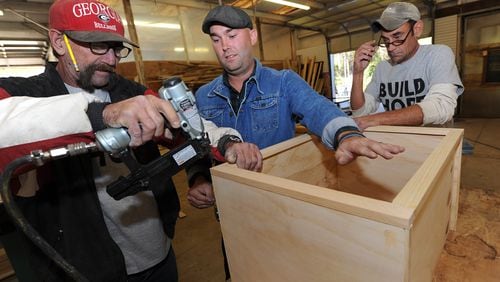Brian Preston knows what its like to teeter on the edge of a financial cliff.
His residential construction business went belly up and he nearly lost his home when the recession hit a few years ago.
Now he's helping pull others back from that same ledge.
Preston is the founder and "chief storyteller" of Lamon Luther, a Villa Rica-based furniture designer and maker that has helped put formerly homeless and near-homeless men back on their feet by giving them jobs and putting tools in their hands.
"I knew how easy it was to be in that kind of situation, " said Preston, who started the business in Janurary 2012. "When everything went down with our family, it had gotten so bad we were having yard sales to make ends meet. I think that's when my passion for poverty exploded."
The first year, the company $150,000 in sales. The business is expected to do a million in sales this year.. He pours the money "back into the guys and hiring more guys."
It started a foundation two years ago to help employees with affordable housing.
Lamon Luther, named after one of Preston's grandfathers, currently employs three full-time and three part-time workers. Preston considers the close-knit group family.
While he could have gone the nonprofit route, Preston, 36, said it was important to run Lamon Luther as a for-profit business and not be dependent on donations.
"I wanted us to create a substantial, legitimate opportunity for our guys, " he said. "They were so used to getting donations and handouts, I didn't want this to be set up that way. I wanted it to be based on the hard work they are putting into the product."
Clients for the tables, benches, beds, cabinets and other custom products have included Mercedes-Benz Stadium, Krog Street Market, the Atlanta Braves and
fast-food restaurant chains.
When Riverside Elementary School in Suwanee was thinking about adding a reading room in its library to honor a student who died, school officials considered several companies but couldn't quite find what they were seeking. But it was almost fate. An artist who was painting a mural outside the space included furniture similar to that made by Lamon Luther, principal Craig Barlow said.
"It was unbelievable, " Barlow said.
Preston designed several custom pieces, made from recycled lumber, that were perfect fits.
"Taking something and recycling it and using folks who are homeless, " Barlow said. "There were a lot of connections. Everything sort of tied together."
Preston, who left his job as a creative director at his church to start Lamon Luther, remembers the first time in 2009 he went into "The Village, " a wooded area near downtown Douglasville that was home to about a dozen or so down-on-their-luck souls. Many were ex-carpenters and former construction workers.
Outside of a few church groups, most people avoided the woods and their struggling residents.
Preston was told it was too dangerous and he would only find trouble, but he wanted to find a way to give back to the community. "I felt my life was too safe, " Preston said. "I got frustrated with myself because I felt I could be doing more to help."
So he and his best friend went. "We couldn't believe that homeless people lived in our community, " he said. "You think it's just in urban areas, but there are huge pockets of suburban homelessness."
They took firewood, clothing and batteries to the camps to make life a little easier. Over time, though, Preston started to feel he was an enabler.
He asked one man, Mitch, what he could do to really help. The answer was simple: They wanted jobs and an opportunity to move out of the woods. Mitch said no one would hire them because they didn't have identification or permanent addresses, or employers believed the people in the woods would be unreliable or unskilled workers.
Their stories captivated Preston. He discovered some of the men were ex-carpenters and former construction workers, which fit well with his own background. Ever since he was a boy, Preston liked to build things.
But the bottom line is really more about the men who work there .
Some of his employees have gotten on their feet and bought houses and are raising families. He currently employess 10 people.
Preston thinks his grandfather, who was an Alabama builder, mechanic and farmer, would be proud that the company bears his name.
"I think he would love it, " he said. "I remember as a kid he would share his crops with other people who didn't have food. (The company) represents the generation of people that built with their hands, and it represents the generosity of his heart."







